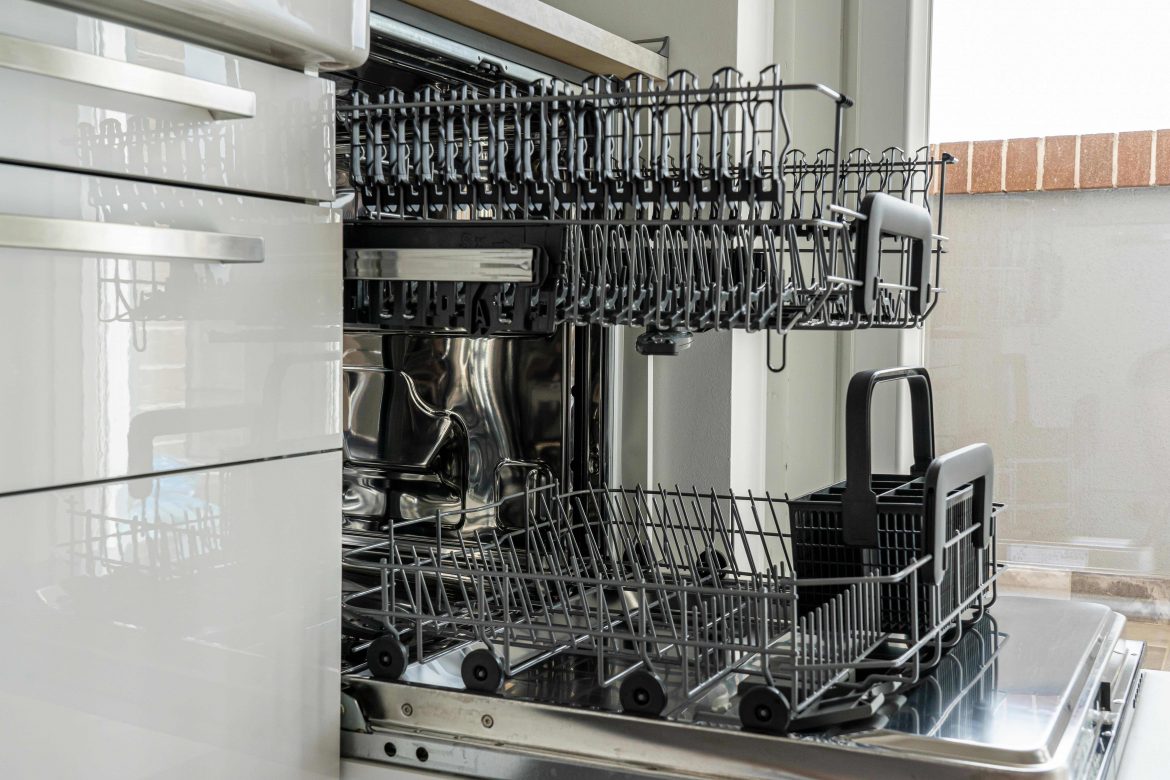Your dishwasher is arguably the hardest-working piece of equipment in the kitchen, next to your fridge, of course. It helps us make after-meal clean-ups a simpler task, which is why it’s so important to regularly maintain it. If unpleasant smells are wafting up from your dishwasher, it’s time for a deep-cleaning session.
Find out how to keep your dishwasher smelling fresh, and the right way to maintain it to avoid it smelling in the future.
What does a smelly dishwasher mean?
Many people assume that dishwashers clean themselves while washing their dishes, but that’s a myth. Over time, food particles, grease, and soap scum can collect in the drain filter or, in some cases, clog the drain. This buildup will lead to unpleasant odours, reduced efficiency, and, in severe cases, mechanical issues.
But dishwashers have other smells, too, so at what point do you need to check in?
- Plastic smell: Very common in brand-new dishwashers, this smell is harmless and should dissipate within two weeks.
- Petroleum smell: Likely produced by the sound-deadening material some dishwashers have, this is harmless and should dissipate within four to six weeks.
- Varnish smell: Totally harmless, this smell can be caused by the varnish used to treat motor windings.
- Mildew smell: The warm and moist environment of dishwashers can cause mildew, particularly in and around the door seals. A simple wipe down will suffice.
- Fishy or rotten food smell: This means the dishwasher filter or drain is dirty or clogged. This reduces your dishwasher’s draining ability and should be cleared as soon as possible.
- Sewage or wet dog smell: This could indicate a possible drainage problem, which may require immediate professional inspection.
How to deodorise your dishwasher
Keeping dishwashers fresh will help ensure your dishes come out clean. Below is a step-by-step deodorising guide perfect for keeping your dishwasher smelling fresh:
What you’ll need
- white vinegar
- dish soap
- dishwasher-safe bowl
- sponge
- soft-bristled brush
- clean, dry towel
Steps
- Empty your dishwasher: remove any dishes, glassware and utensils before deodorising.
- Remove the filter: start by pulling out and removing the bottom dish rack. Then remove the filter (use your dishwasher’s manual to guide you here; each brand and model has varying processes).
- Rinse and soak the filter: Rinse and remove any debris, and soak it in warm, soapy water to remove any grime or buildup. For stubborn particles, use a soft-bristled brush to gently scrub the filter. Replace once clean.
- Clean the dishwasher interior: Pour two cups of white wine vinegar into a lidless dishwasher-safe bowl and place it onto the bottom rack of the empty dishwasher. Select your usual dishwashing cycle, with the ‘dry option’ turned off (if your model has this setting). Run it (without using extra dishwashing soap) and leave the vinegar to do its magic (it will mix with the wash water to neutralise odours and sanitise your dishwasher).
- Clean the gasket seals: It’s essential to regularly clean your dishwasher’s gasket seals to prevent mildew or mould from growing. Use warm, soapy water and a sponge to wipe the seals. Once clean, use a paper towel or a clean, dry kitchen towel to dry the seals completely.
- Schedule a service: If, after a deodorising session, your dishwasher continues to smell, there may be a clog in the drain hose or a more complex problem. Book a technician for diagnoses, repair or service.
Tips for dishwasher maintenance
Although regular deodorising and deep cleaning are great maintenance to keep your dishwasher in tip-top shape, here are a few additional tips to prevent your dishwasher from smelling in the future:
- Dishwasher door: Keep this ajar after a cycle or when the dishwasher isn’t in use. This will prevent the seals from growing mould or mildew.
- Dishwasher filter: Clean this regularly (at least every two weeks) to prevent food particles from accumulating.
- Dishwasher racks: Avoid overloading dishwasher racks to allow for the proper and intended amount of water and soap to pass through each dish, helping to break down food debris.
- Scrape food residue: Although not always necessary with modern models, consider scraping large food particles to prevent clogs and buildup.
- Additional cleaning agents: You can use dishwasher cleaning agents to reduce odour-causing residues and maintain a fresh scent. Look up your dishwasher brand and see what they have to offer, or visit your local supermarket or Builders to see what’s in stock.
Keeping your dishwasher smelling fresh and in tip-top shape is very easy. With regular cleaning and scheduled deep-cleaning days, you won’t be smelling any foul odours in the future!

